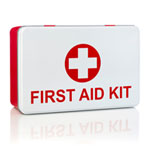Health Symptoms You Should Never Ignore

Although no one knows your body like you do, it’s easy to have a tendency to ignore health symptoms and brush them off as nothing. However, there are actually some very common signs that your body may be telling you something is wrong and those shouldn’t be ignored.
The body often signals something is wrong through the feeling of pain. Pain is a symptom and if it lingers for a prolonged amount of time, it is a sign that something is not right. Take for example, a headache. Most headaches usually go away after taking a pain-reliever and are usually nothing to worry about. On the other hand, if the headache is sudden and severe, it could actually be a sign of an aneurysm or a burst blood vessel.

While it is true that people can have an aneurysm and not have any problems, many times it can actually be life-threatening when it happens in the brain, according to Dr. Michael G. Millin, associate professor at Johns Hopkins University School of Medicine, Department of Emergency Medicine.
Dr. Millins also states that when we think of chest pain, we often only think of the heart, but there are several things that could be caused by chest pain, including pulmonary embolism, blood clot, collapsed lung, ruptured esophagus, fluid around the heart and aortic dissection. It is important to pay attention to the signs that also accompany the chest pain, specifically, symptoms of shortness of breath and fatigue. If just going outside for a short walk leaves you feeling exhausted, short of breath and tightness in your chest without improvement, it may be necessary to seek medical attention.
Another symptom that is important for you not to ignore is numbness. Numbness can be the result of several reasons, including a poor choice in footwear, a pinched nerve or even a panic attack. However, if you experience numbness confined to one side of your body, this could possibly indicate a stroke and you should see a physician immediately.
If you still have your appendix and experience severe pain on the right side, it is possible that you have an appendicitis, which would require emergency medical treatment. If an inflamed appendix goes untreated, it will eventually burst, spreading a serious infection within the abdominal cavity’s lining that can be fatal unless it is treated quickly.
Aside from appendicitis, there are some other common causes of abdominal pain, which include gallstones, ectopic pregnancy or ovarian cysts in women, urinary tract infection (UTI), peptic ulcers, lactose intolerance or constipation. The bottom line is, when it is unexplained, it is good to get a diagnosis as soon as possible.
Many people at the end of the day often experience feet and ankle swelling as a result of fluid buildup. Even a healthy person can experience foot swelling, which will normally resolve itself after resting and elevating the feet. However, if the swelling persists, or is severe (it is known as peripheral edema), it can cause complications, including stiffness, painful chronic swelling, scarred tissue, skin ulcerations, difficulty in walking, an increased risk of infection and a decrease in blood circulation.
Peripheral edema is common at any age; it is however, more common in adults and the elderly. It can also occur in one or both feet, and if you experience any of these symptoms, it is best to call you primary care physician.
You might also be interested in...
-
 10 Signs You May Not Be Drinking Enough Water
10 Signs You May Not Be Drinking Enough Water
-
 8 Signs You May Not Be Getting Enough Magnesium
8 Signs You May Not Be Getting Enough Magnesium
-
 About Life Insurance
About Life Insurance
-
 Do You Really Need Life Insurance?
Do You Really Need Life Insurance?
-
 Does Divorce Spell The End Of A Happy Childhood
Does Divorce Spell The End Of A Happy Childhood
-
 Globe Life is Rated A (Excellent)
Globe Life is Rated A (Excellent)
-
 Health Symptoms You Should Never Ignore
Health Symptoms You Should Never Ignore
-
 History of Life Insurance
History of Life Insurance
-
 Home Cough Remedies
Home Cough Remedies
-
 How High Should Your SPF Be
How High Should Your SPF Be
-
 How To Be Responsible About Life Insurance
How To Be Responsible About Life Insurance
-
 Is Eating Organic Really Safer?
Is Eating Organic Really Safer?
-
 Is White Vinegar A Safe Cleaning Agent?
Is White Vinegar A Safe Cleaning Agent?
-
 Planning Your Family For An Emergency Evacuation
Planning Your Family For An Emergency Evacuation
-
 The Difference Between Power Of Attorney And A Living Will
The Difference Between Power Of Attorney And A Living Will
-
 Reconsider Getting a Life Insurance Policy
Reconsider Getting a Life Insurance Policy
-
 Setting Goals For Your Employees
Setting Goals For Your Employees
-
 Skills that Make Bosses Want to Hire You
Skills that Make Bosses Want to Hire You
-
 The Importance of Life Insurance
The Importance of Life Insurance
-
 The Importance of Term Life Insurance
The Importance of Term Life Insurance
-
 Is It Time To Review Your Life Insurance Policy?
Is It Time To Review Your Life Insurance Policy?
-
 Tips On How To Prevent E.coli
Tips On How To Prevent E.coli
-
 Too Busy to Stay Healthy?
Too Busy to Stay Healthy?
-
 What Is COPD And How You Can Prevent It?
What Is COPD And How You Can Prevent It?
-
 What is Term Life Insurance?
What is Term Life Insurance?
-
 When Insurance Becomes an Investment
When Insurance Becomes an Investment
-
 Choosing Whole Life Vs Term Life Insurance
Choosing Whole Life Vs Term Life Insurance
-
 Why You Should Look Into Term Life Insurance
Why You Should Look Into Term Life Insurance
-
 Making Your Home Senior-Friendly
Making Your Home Senior-Friendly
-
 Is Whooping Cough Making A Comeback
Is Whooping Cough Making A Comeback
-
 Unusual Tricks To Reduce The Risk Of Heart Disease
Unusual Tricks To Reduce The Risk Of Heart Disease
-
 The Best First Aid Kit Everyone Should Have
The Best First Aid Kit Everyone Should Have
-
 Beware Of Dangerous Mold
Beware Of Dangerous Mold
-
 5 Things You Should Know About Thyroid Health
5 Things You Should Know About Thyroid Health
-
 What Your Eyes Reveal About Your Health
What Your Eyes Reveal About Your Health
-
 Everyday Things That Can Cause Memory Loss
Everyday Things That Can Cause Memory Loss
-
 How To Discuss Life Insurance With Your Spouse
How To Discuss Life Insurance With Your Spouse
-
 Why That Cold Won’t Go Away
Why That Cold Won’t Go Away
-
 5 Ways To Keep A Healthy Smile
5 Ways To Keep A Healthy Smile
-
 How Dangerous Is Sugar?
How Dangerous Is Sugar?
-
 5 Warning Signs To Change Healthcare Providers
5 Warning Signs To Change Healthcare Providers
-
 Simple Secrets To Conquer Flu Season
Simple Secrets To Conquer Flu Season
-
 The Hidden Bad Side Of Everyday Foods
The Hidden Bad Side Of Everyday Foods
-
 How To Avoid The Scams That Tricked So Many
How To Avoid The Scams That Tricked So Many
-
 Six Foods That May Reduce Stroke Risk
Six Foods That May Reduce Stroke Risk
-
 Empty Nesters: Don’t Ditch Life Insurance Until You Consider This
Empty Nesters: Don’t Ditch Life Insurance Until You Consider This
-
 How Does Accidental Death Insurance Work?
How Does Accidental Death Insurance Work?
-
 4 Tips To Improve Your Credit Score
4 Tips To Improve Your Credit Score
-
 6 Tech Devices You Need For Family Safety
6 Tech Devices You Need For Family Safety
-
 Public Transportation Safety Tips
Public Transportation Safety Tips
-
 Is Globe Life Insurance Reliable?
Is Globe Life Insurance Reliable?
-
 Hazards in the Kitchen: What You Do Every Day that Puts You at Risk for a Serious Accident
Hazards in the Kitchen: What You Do Every Day that Puts You at Risk for a Serious Accident
-
 Surviving a Snake Bite
Surviving a Snake Bite
-
 Is Globe Life Insurance Term or Whole Life?
Is Globe Life Insurance Term or Whole Life?
-
 The Top 4 Leading Causes of Death for People Older Than 50 and How to Avoid Them
The Top 4 Leading Causes of Death for People Older Than 50 and How to Avoid Them
-
 Nine Eye-Opening Stats That Will Make You Rethink Texting and Driving
Nine Eye-Opening Stats That Will Make You Rethink Texting and Driving
-
 Risks of Dying from Cancer
Risks of Dying from Cancer
-
 What are the Odds of Dying While Taking a Selfie?
What are the Odds of Dying While Taking a Selfie?
-
 Can I Get an Accidental Death Quote Online?
Can I Get an Accidental Death Quote Online?
-
 Buying Life Insurance for the Whole Family
Buying Life Insurance for the Whole Family
-
 What You Need to Know Before Buying Term Life Insurance
What You Need to Know Before Buying Term Life Insurance
-
 Advantages and Disadvantages of Getting Life Insurance without a Medical Exam
Advantages and Disadvantages of Getting Life Insurance without a Medical Exam
-
 A New Year's Resolution You Can Keep: Buy Life Insurance
A New Year's Resolution You Can Keep: Buy Life Insurance
-
 Food Contamination: Ways to Avoid the Potential Dangers and Keep Food Safe
Food Contamination: Ways to Avoid the Potential Dangers and Keep Food Safe
-
 Can I Increase the Face Value of My Term Life Insurance?
Can I Increase the Face Value of My Term Life Insurance?
-
 What is Mortgage Protection Insurance?
What is Mortgage Protection Insurance?
-
 Do I need Accidental Death Insurance?
Do I need Accidental Death Insurance?
-
 How Does a Graded Death Benefit Whole Life Insurance Policy Work?
How Does a Graded Death Benefit Whole Life Insurance Policy Work?

 Insurance products are available in New York from
Insurance products are available in New York from  Insurance products are available in your state from
Insurance products are available in your state from 









































































